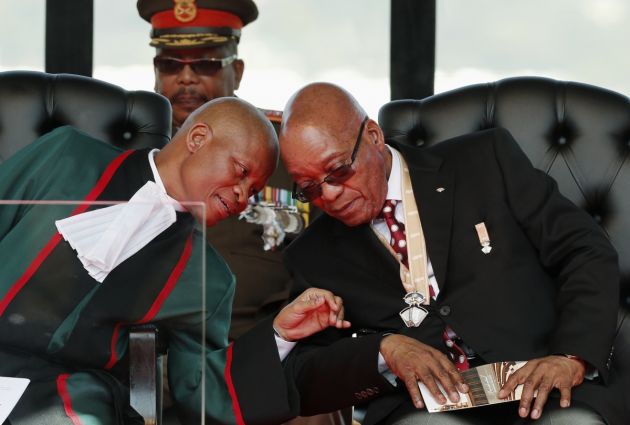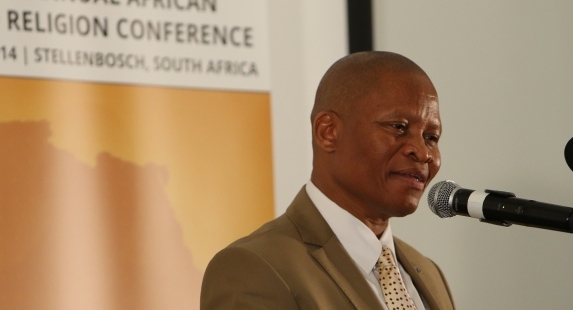South Africa's top judge stirs debate urging infusion of law, religion to fight crime

South Africa's top judge has said corruption and many other social ills are largely due to a failure to infuse law with a measure of religion and morality.
Chief Justice Mogoeng Thomas Reetsang Mogoeng said infusing law with religion could help turn around crime, corruption, maladministration, lackadaisical effort by government functionaries, dishonesty and injustice.
"People steal and boast about what they have been able to buy through the process of theft and corruption," lamented the highest ranking judge in the country at the May 26 to 28 conference.

He delivered a keynote address at the second annual conference on Law and Religion in Africa hosted jointly by the law and theology faculties at Stellenbosch University on Tuesday.
His comments have stirred a debate in South Africa drawing criticism from a theologian and a constitutional law expert.
The judge highlighted the importance of morality and said "we need to develop a moral code of shorts and the values of our Constitution could be used as a sound basis for the development of such a code."
PENTECOSTAL LAY PREACHER
Mogoeng is a lay preacher in the Pentecostal Winners' Chapel and said law and religion can play a vital role in the moral generation we so desperately need.
"Law and religion can help shape a peaceful and prosperous society," he said.
His appointment by President Jacob Zuma to be Chief Justice of the South Africa Constitutional Court on September 8, 2011 stirred controversy among legal experts. Some have criticized his lenient rulings in child rape cases and those involving violence against women.
The Nobel Women's Initiative has accused him of raising dangerous myths about rape, and of blaming victims.
In his speech Mogoeng added that there is a strong correlation between law and religion in South Africa.
He said society should take advantage of "the potency of religion to make a profound difference it can make in sharpening the teeth of our legal instruments."
While highlighting the prominence of religion, he pointed to its abuse and distortion by many people in the oppression of others.
He advocated religious tolerance in South Africa, and said the hallmark of an open and democratic society is its ability to accommodate different views and lifestyles.
Earlier, former Constitutional Court Judge Albie Sachs, who was also a keynote speaker at the conference, called for the co-existence of different worldviews in a pluralistic society.
Differences need to be managed said Sachs who highlighted the important role of religion in society, saying it is not just a private matter.
Commenting on the chief judge's speech, Pierre de Vos, a professor of constitutional governance at the University of Cape Town's law faculty, cited a ruling by Justice Sachs, the Cape Argus newspaper reported.
"In the judgment, the values of the constitution - human dignity, equality and freedom - are viewed as sacrosanct.
"The constitution requires in an open and democratic society the rights of non-believers to be respected.
"Judge Sachs says there must be 'respect for the co-existence between the secular and the sacred.'
"That means that in the legislative sphere, in the political sphere, the secular holds sway," he explained.
De Vos stressed, however, "That doesn't mean that people cannot have their religious beliefs. Just that it is the role of the constitution to ensure that the view of the majority doesn't oppress other groups."
Stellenbosch academic, theologian and author, Dion Forster, commented on his blog site entitled, "Why Chief Justice Mogoeng Mogoeng is wrong - law infused by religion is a bad idea."
He wrote, "You don't want an anti-religious government - like that in the former USSR or China, where people of faith are persecuted.
"Faith is an important part of life... But you certainly don't want a religious government - we have simply seen too many of these kinds of governments abusing people," Forster wrote.
Instead, Vorster argued for "an honest, impartial, just, servant-minded secular state... A state that will protect and uphold the rights of all of its citizens, giving equal space for all to exercise their positive beliefs."
The theme of the conference was "The Quest for the Common Good in Pluralistic Societies."

The first Law and Religion in Africa Conference was held in Accra, Ghana in January 2013.
